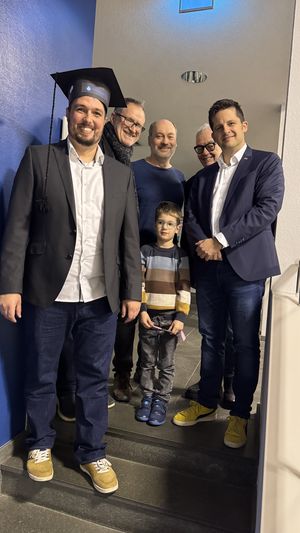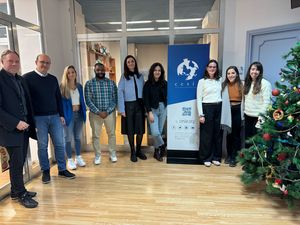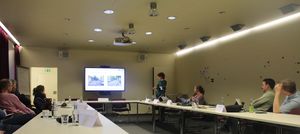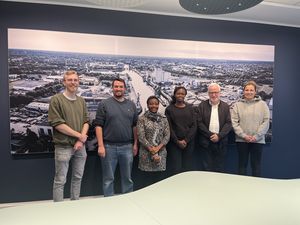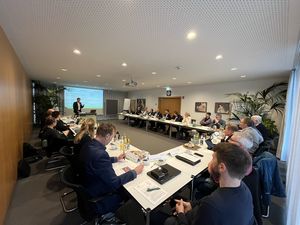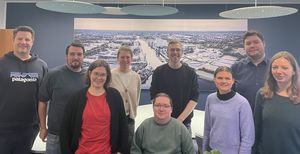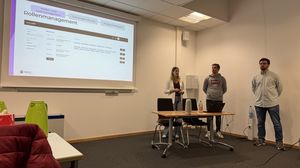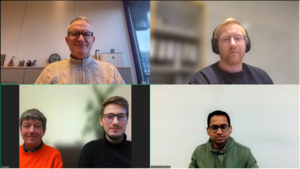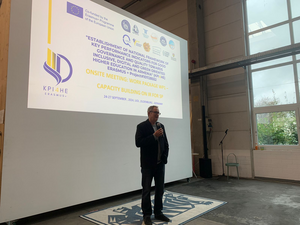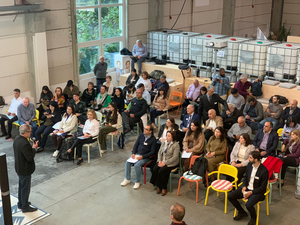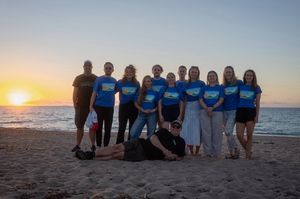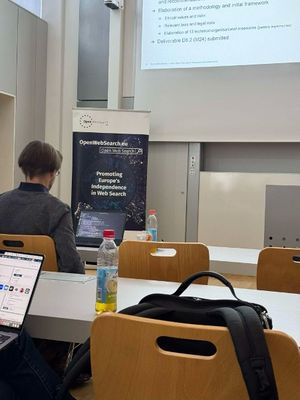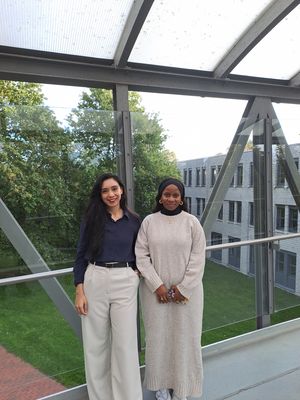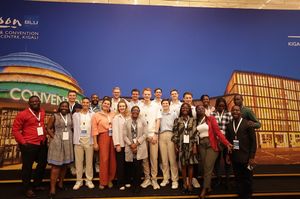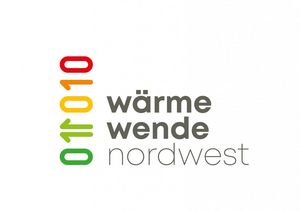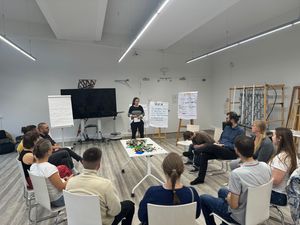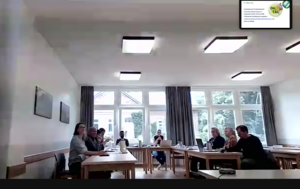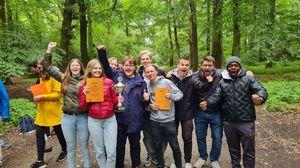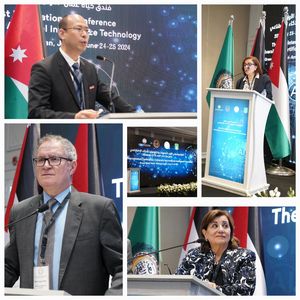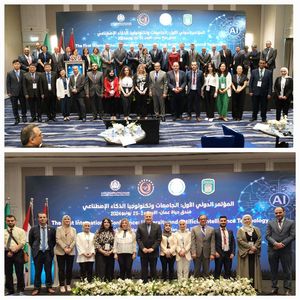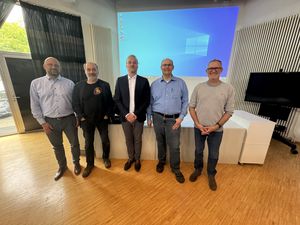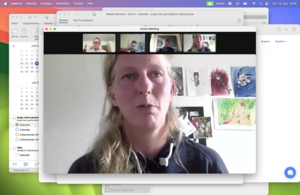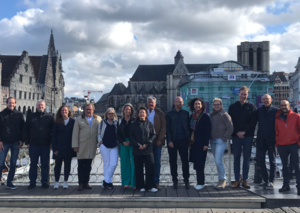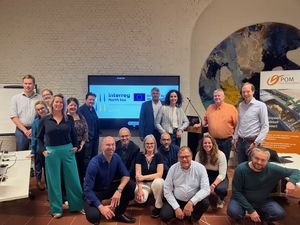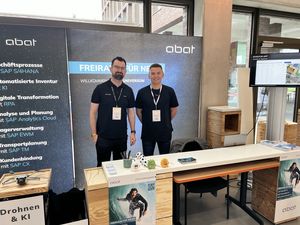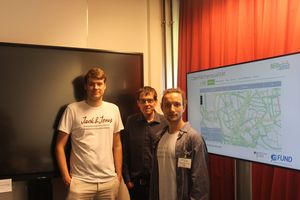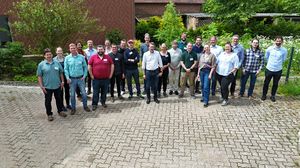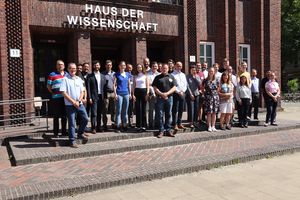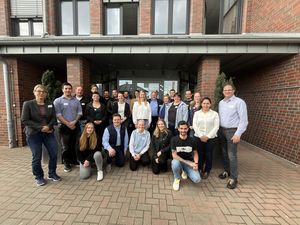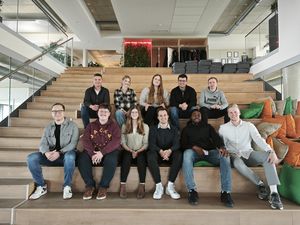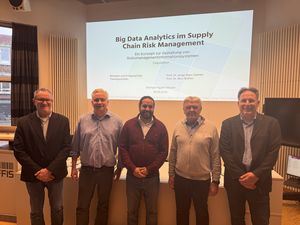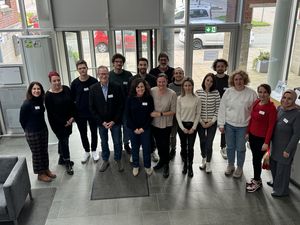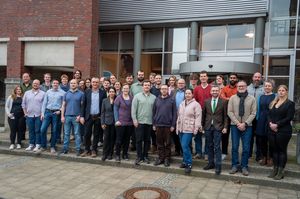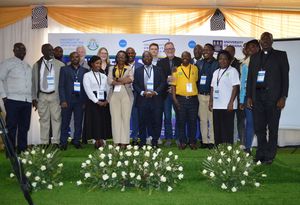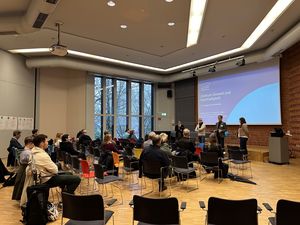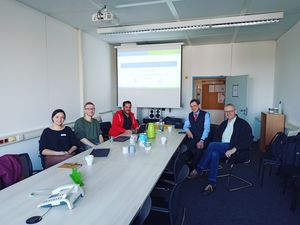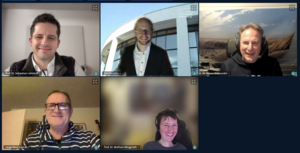2024
2024
03.12.2024: Kick-Off Meeting and Workshop Report: Advancing Ethics, Policy, and Methodology in AI for GBV Interventions
On December 3, 2024, the University of Oldenburg hosted a pivotal workshop in Palermo, Italy, as part of Project SHIELD’s Work Package 2 (WP2). The workshop focused on addressing ethical, policy, and methodological challenges in leveraging Artificial Intelligence (AI) to combat gender-based violence (GBV) among youth. WP2 aims to ensure ethical and evidence-based AI applications by deepening ethical frameworks, producing comprehensive datasets, establishing robust methodologies, and engaging diverse stakeholder insights. The Project falls under Erasmus + funding program for cooperation partnerships in youth.
The event brought together project partners—University of Alicante, BiRA (Basque International Research Associationt), Giosef Italy (Giovani Senza Frontiere), CESIE ( Central European Centre of Studies and Initiatives), DFW2W (Dutch Foundation for Innovation Welfare to Work), and KMOP (KENTRO MERIMNAS OIKOGENEIAS KAI PAIDIOU)—comprising of researchers and civic stakeholders to foster collaboration and ensure alignment with EU guidelines and industry best practices. Leading WP2, the University of Oldenburg is also tasked with contributing to developing an AI chatbot and digital platform integral to the project.
Key discussions centred on mitigating AI bias, ensuring privacy, and promoting transparency and accountability in AI-driven GBV interventions. The workshop introduced critical frameworks, including the EU’s GDPR and AI Act, as foundational elements for responsible AI development, emphasising transparency and ethical safeguards in data handling and chatbot design. Methodological approaches such as mixed methods research, incorporating focus groups, expert interviews, and surveys, were highlighted to ensure diverse and inclusive insights into GBV challenges.
This workshop underscored the importance of interdisciplinary collaboration and established a solid foundation for developing innovative, ethical, and evidence-based AI solutions to address GBV. Below is a photo of the kick-off meeting and workshop participants.”
27.12.2024: Workshop konkretisiert Anforderungen an KI Systeme zur Erkennung von Radfahrenden
Das neu gestartete Forschungsprojekt BikeDetect hat im Rahmen eines Stakeholderworkshops seine Anforderungsanalyse konkretisiert und die kommenden Entwicklungsarbeiten mit praktischen Bedürfnissen abgestimmt. Das Meeting, das am 27. November 2024 bei der Stadt Osnabrück stattfand, konnte aktiv Akteure u.a. aus den Bereichen öffentlicher Nahverkehr, Verkehrs- sowie Geodaten und Stadtreinigung in die Diskussion zur datenunterstützten Erhöhung der Verkehrssicherheit von Radfahrdenen einbinden. Übergeordnet ging es um die Fragestellung, welche Funktionalitäten ein KI System zur Erkennung von Radfahrenden im Straßenverkehr abdecken muss und wie ein darauf aufbauendes Fahrassistenzsystem für den Autofahrer ausgestaltet sein könnte.
Zunächst wurden potentiell nutzbare Sensorsysteme diskutiert. Es sollen dabei Sensoren kombiniert werden, die sich a) für die Detektion von Radfahrenden und b) für die Messung von Abständen eignen. Durch die Vereinigung der Datenströme könnten zu enge Manöver zum Überholen bzw. Vorbeifahren detektiert werden. Die genaue Definition eines Überholvorganges kann aus rechtlichen Vorgaben, aber auch anhand des technischen Aufbaus der Fahrzeuge im realen Straßenverkehr abgeleitet werden. Darauf aufbauend lassen sich verschiedene Anforderungen an die Eigenschaften der KI Modelle definieren, die im Workshop mit den Expertinnen und Experten diskutiert wurden. Die Detektion von Radfahrenden muss grundsätzlich in Echtzeit im Straßenverkehr erfolgen können, um perspektivisch Autofahrende über die unzureichende Einhaltung geltender Verkehrsregeln in Kenntnis setzen zu können. Für die kamerabasierte Datenerhebung im Straßenverkehr bestehen zudem seitens des Datenschutzes erhöhte organisatorische Anforderungen, die ausführlich erörtert wurden.
Die Datengrundlage wird mit einem Feldtest, der für den Herbst 2025 im Stadtgebiet von Osnabrück geplant ist, geschaffen. Die ausgewählten Sensoren werden dabei an der Außenfläche eines Transporters montiert. Die Diskussion bezog sich im Zusammenhang mit der Befahrung der Verkehrsinfrastruktur auch auf unterschiedliche Ausprägungen von Radverkehrsanlagen. Grundsätzlich sollten alle Strecken mit hoher Radverkehrsstärke wiederholt durch das Messfahrzeug befahren werden, um möglichst viele Radfahrende robust aufnehmen zu können. Damit Autofahrende perspektivisch sinnvoll gewarnt werden können, sollten künftig auch verlässliche Geodaten z.B. zur Ausprägung der Fahrradinfrastruktur Eingang in das Datenmanagement finden, da bei manchen Führungen des Radverkehrs Warnhinweise während der Fahrt eher ablenken könnten. Der abschließende Teil der Diskussion bezog sich auf eine spätere mögliche Ausgestaltung eines Fahrassistenzsystems für Autofahrende. Warnhinweise zu Radfahrenden sollten im Fahrzeug grundsätzlich (wie heute bereits üblich) visuell und auditiv deutlich wahrnehmbar sein, aber auch nur dann erscheinen bzw. ertönen, wenn es die Fahrsituation dies wirklich erfordert.
Das Projekt BikeDetect will datenbasiert die Verkehrssicherheit von Radfahrenden erhöhen. Hierzu sollen Ansätze identifiziert werden, die eine Verknüpfung von KI basierten Detektionen von Radfahrenden im Straßenverkehr mit Abstandsmessungen ermöglichen, um perspektivisch Autofahrende bei der Einhaltung von Mindestabständen unterstützen zu können. Das Projekt BikeDetect wird für 18 Montate mit ca. 200.000 € durch die Innovationsinitiative mFUND des Bundesministeriums für Digitales und Verkehr (BMDV) gefördert. Die Universität Oldenburg hatte zum Projektstart auch eine entsprechende Pressemitteilung verbreitet. Wir bedanken uns sehr herzlich bei der Stadt Osnabrück für das Hosting und die Organisation des Austauschs mit den Fachexpertinnen und Fachexperten
25.11.2024: Visit from Ghana - Internship at OOWV
On the 25th of November 2024, the Oldenburgisch-Ostfriesischer Wasserverband (OOWV) and the University of Oldenburg welcomed two doctoral students from Ghana, Africa. Ivy Serwaa Gyimah Akuoko and Pearl Awudor are visiting Germany for a total of three weeks to complete an internship as part of their doctoral program.
The two environmental scientists are particularly interested in wastewater management, so they have been offered an internship in the water supply and wastewater disposal department at OOWV, the largest water supplier in the north-west in terms of area.
In addition to the actual internship content, a series of excursions are planned during the three weeks to provide practical insights into the topic of water management. These include visits to a water laboratory in Nethen, a sewage treatment plant in Oldenburg and a waterworks on Spiekeroog.
We wish the two interns every success in completing their internship and will be actively supporting them over the next few weeks!
22.11.2024: Kick-off expert advisory board for the TiPP project
The inaugural meeting of the expert advisory board for the TiPP research project as part of the Oldenburger-Münsterland future region took place on 19 November 2024. The 20 experts represent individual areas of the value chain as well as interest groups and research institutions. In this context, the individual work packages of the project were first presented and then discussed in a lively manner. One of the main tasks of the expert advisory board will be to support the development of indicators for the pig value chain. We are delighted to welcome such a broad-based expert advisory board as part of the project and look forward to an exciting and constructive collaboration!
21.11.2024: Kickoff event for the continuation of the WISdoM project series: AWARD
On Tuesday, 19.11.2024, the kick-off event for the continuation of the WISdoM project series was held at the Trink- und Abwasserzentrum (TAZ) of the Oldenburgisch-Ostfriesischer Wasserverband (OOWV). The event was attended by interested OOWV employees and the project managers from the VLBA, Pascal Säfken and Jan Stüven.
In the 90-minute event, it was communicated how the research cooperation will be structured in the period of 01.06.2024 - 31.05.2027 and which topics will be primarily dealt with. The continuation will primarily focus on expanding topics such as business intelligence and advanced analytics in water management. The WISdoM OSS will be expanded for this purpose. There are also plans for at least two project groups on climate adaptation and various events in the context of water management development. Finally, a new name was chosen for the project. Instead of WISdoM 3.0, it will now be called AWARD - Advanced Water Analytics in Research and Development.
The atmosphere at the event was cheerful and the team is motivated to start the project.
20.11.2024: Interim presentation of the GENIUS project group
An interim presentation was held at the beginning of November as part of the GENIUS project group, which is exploring the potential of generative AI in company-specific applications. The project group, which is being carried out in cooperation with abat AG from Bremen, commenced in April 2024 and will conclude in March 2025.
At the event, the current results and use cases were presented, including document management, the use of a knowledge database and answering questions using generative AI. In addition to members of the University of Oldenburg faculty, representatives from abat and external guests were also in attendance.
The presentation provided valuable insights and established a foundation for the next phase of the project, which will be further developed in an upcoming workshop. The final results will be presented at the beginning of April 2025. For further information, please contact the project group via email at pg-genius@informatik.uni-oldenburg.de or visit the research cooperation website (www.point-project.org) to view the latest developments.
14.11.2024: Erasmus+ KeyAction 171
As part of the Erasmus+ KeyAction 171 programme, the Very Large Business Applications (VLBA) department is hosting several exchange students and academic staff. Liston and Rehema are here from Tanzania for the winter semester as part of their PhD programme. Another six students are visiting from Mauritius for a semester abroad on the Bachelor's programme. Prof Kisangiri Michael from Tanzania also visited for a fortnight until 7 November 2024.
11.11.2024: MobiLe Phase III – Kick-Off Meeting
On November 11, 2024, a kick-off meeting for the project “MobiLe - Mobility Turnaround @ Quality of Life” Phase 3 took place online at the University of Oldenburg. The cooperation partner, the city of Norderstedt, also took part in this meeting. During the meeting, the results achieved in phase 2 were discussed. The tasks and objectives of phase 3 were also discussed.
The aim of the MobiLe research project is to develop an innovative decision-making tool for transportation-related decisions. This tool is intended to take a systemic view of the transport system in conjunction with other aspects of high-quality, sustainable urban development.
The aim of phase 3 is to consolidate and transfer the results of phase 2 to other municipalities.
Partners involved
- Stadt Norderstedt
- Carl von Ossietzky Universität Oldenburg, Department VLBA
29.10.2024: Successful Workshop in Oldenburg to Improve Higher Education in Armenia
On September 27 and 28, 2024, a successful workshop took place in Oldenburg as part of the Erasmus+ project “Establishing a National Framework of Performance Indicators for Good Governance and Quality in Inclusive, Digital, and Environmentally-Oriented Higher Education in Armenia” (KPI4HE). The project aims to make Armenian higher education future-proof by introducing a national KPI framework and enhancing institutional research and planning services.
The workshop focused on presenting the project's progress and planning the next steps. Key aspects included developing a training kit, training staff, and revising national accreditation standards in Armenia. Participants praised the workshop as a great success, further strengthening the collaboration between the international partners.
The next project meeting will be held in Genoa in March 2025 to continue advancing progress and supporting sustainable change in Armenia's higher education system.
24.10.2024: New BikeDetect project wants to improve the detection of cyclists in real traffic scenarios
Artificial intelligence (AI) approaches could be increasingly used in future real traffic scenarios to increase road safety of vulnerable road users (e.g. cyclists). In order to increase efforts in researching this field of interest, a new consortium has been formed as part of a feasibility study entitled BikeDetect. The pilot study will develop a prototypical sensor system and appropriate AI methods not only to detect cyclists in traffic scenarios but also to recognize the distances when overtaking or passing cyclists nearby. In order to discuss the key objectives and goals of the project, the consortium met for the official kick-off meeting on 23rd of October 2024. The project is being funded for 18 months by the Federal Ministry of Digital and Transport (BMDV) in the mFUND innovation initiative with almost 200.000 €.
The internal meeting took place on the invitation of the VLBA Department of Business Information Systems and was held entirely online due to illness and scheduling conflicts. Project coordinator Johannes Schering (VLBA) presented the most important work steps, goals and tasks for the forthcoming months. iotec GmbH from Osnabrück, represented by Daniel Mentrup and Johannes Wilbers, is responsible for the selection and implementation of the measurement technology as a provider of sensor solutions. The city of Osnabrück will support as an associated partner gathering the technical requirements, the evaluation from the city perspective and inform the general public about the results. Ulla Bauer as cycling coordinator and Luca Bauer from the Smart City team presented the relevant content. The project sponsor VDI/VDE was represented by Ms. Juliane Hanel. In addition to project coordination, VLBA is responsible for the selection and development of AI models for the detection of cyclists. The results are to be combined with distance measurements in order to identify critical situations in road traffic.
The main goal of BikeDetect is to find out which combination of sensors is best suited to enable a reliable detection of cyclists from a vehicle. The team is trying to find the most cost-effective methods possible to make the system achievable for cities. The practical researchers are testing ultrasound, radar and optical methods to measure distances, and they are using LiDAR, 3D cameras and thermal measurements to detect cyclists. The aim of VLBA is to create an AI system that processes the recorded data. This system is being developed step by step and tested and improved in the laboratory, in a parking lot and in road traffic. The city of Osnabrück and the ADFC are involved in selecting as many different routes as possible for the field tests. The city of Osnabrück sees the project as an opportunity to increase cycling safety. The aim is to give motorized road users tools with which they can contribute even better to protecting cyclists. The team plans to present the results to the general public. A requirements workshop which will be held at the end of November in Osnabrück with technical employees from the city administration as well as other stakeholders from the business world and the ADFC is organized for this purpose. The most important parameters for measurement technology, data collection and AI models will be determined in this context.
About the mFUND funding program
As part of the mFUND funding program, the BMDV has been supporting research and development projects relating to data-based digital innovations for the mobility of the future since 2016. The project funding is supplemented by active technical networking between stakeholders from politics, business, administration and research and the provision of open data in the Mobilithek.
Further information about the project can be found on the BMDV website: www.bmvi.de/SharedDocs/DE/Artikel/DG/mfund-projekte/bikedetect.html
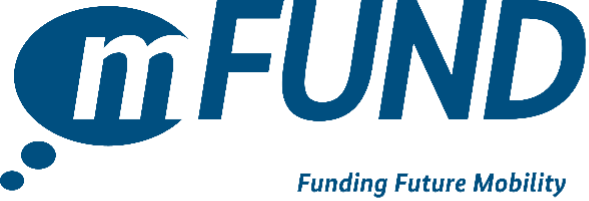
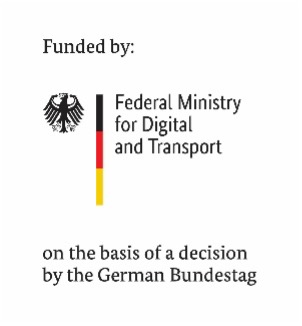
15.10.2024: SANDbrain Summer School 2024
The SANDbrain Summer School took place from 29/09/2024 to 05/10/2024 in Badesi, Sardinia, Italy. In six workshops, students from Oldenburg worked on various problems and developed different solutions. These were presented to the partner, the Rangers Charity Foundation, at the end of the summer school as part of a pitch per student group. The presentations far exceeded the partner's expectations and so this summer school can also be considered a complete success.
14.10.2024: MigHANA Research Cooperation Successfully Enters Second Phase
On October 14, the first quarterly meeting of the MigHANA research cooperation between the Oldenburg-East Frisian Water Board (OOWV) and the VLBA department of Oldenburg University took place. Since entering its second phase in May, the collaboration has focused on artificial intelligence. Of the five planned theses for this phase, one bachelor’s thesis has already begun, while two master’s theses are currently in the proposal stage and are set to start later this year. The research topics include mapping AI applications in water management, developing automated processes to create value driver networks for shareholder value and sustainability, and designing a hybrid data warehouse architecture for predictive and prescriptive analytics.
14.10.2024: Kickoff-Veranstaltung für Projekt DISCO – Digital Solutions for Climate Adaptation
From the 10.09.2024 to the 12.09.2024 the Kickoff-Event for the new Interreg North Sea Project DISCO – Digital Solutions for Climate Adaptation took place in Zwolle, Netherlands. The project has officially launched successfully. An international team, consisting of partners from Belgium, Denmark, Germany, the Netherlands as well as Sweden decided for the next three years to research and test digital solutions for Climate Change Adaptation (CCA) in the North Sea Region (NSR).
The official project goal is to raise innovative capacities of cities and regions in the North Sea Area. Doing so shall enhance the willingness of decision makers to implement digital solutions, like they are developed in the project, in their communes in order to fasten the CCA in Europe. Therefore, partners from science, economy and public administration are researching different prototypes.
The VLBA is taking part in DISCO as a research- and implementing partner, together with the OOWV, the “Oldenburgisch-Ostfriesischer Wasserverband”, to develop a digital twin for a rainwater retention basin. With this twin, the basin will be controlled in the future, e.g. to actively use collected rainwater for irrigation purposes instead of wasting it into the sewer system.
08.10.2024: Consortium Meeting and Sustainability Workshop for the OpenWebSearch (OWS) Project
On October 7th and 8th, 2024, the consortium meeting and sustainability workshop for the OpenWebSearch (OWS) project, part of the Horizon 2020 EU initiative, took place. The workshop was attended by MSc. Khurram Shehzad and MSc. Sreedhar Kokkarachedu (virtually), researchers from the Business Informatics department of the Universität Oldenburg’s Very Large Business Applications (VLBA) group, under the supervision of Prof. Dr.-Ing. habil. Jorge Marx Gómez. The VLBA group participated as a new third-party partner under the NORDLINK project, which had been previously introduced.
The OWS project aims to create an independent and transparent internet search index comparable to Google, supporting services like large language model (LLM) training in AI applications. The project involves collaboration between European universities and major computing centers, such as LRZ and CERN, to handle web crawling and data storage. NORDLINK, as a third-party partner, will provide local data center infrastructure, facilitating future machine learning activities for students and researchers.
The first day focused on status updates from various work packages, presented by partner organizations such as DLR, LRZ, CERN, and Universität Passau, alongside commercial partners involved in application-based activities. NORDLINK, from Universität Oldenburg, was formally introduced as a new third-party partner. This was followed by a sustainability workshop aimed at ensuring the long-term legacy and continuity of the OWS project to benefit students, researchers, and the broader European community.
On second day MSc. Khurram Shehzad, under the supervision of Prof. Dr.-Ing. habil. Jorge Marx Gómez, presented the scope of the NORDLINK project. The presentation highlighted the capabilities of the VLBA group and the facilities that would support the project’s goals, particularly regarding the integration of the Universität Oldenburg’s local data centre with the OWS infrastructure. Following the presentation, technical discussions were held on the integration process, focusing on technologies such as S3 and iRODS.
The two days meeting and workshop concluded with the successful onboarding of third-party partners, including NORDLINK, and discussions on their contributions to the project and future collaboration towards establishing an independent web search infrastructure for Europe.
01.10.2024: Pressemitteilung – Mehr Sicherheit für Radfahrer
Fahrzeuge sollen Radfahrer mit Hilfe von KI automatisch erkennen können
Oldenburg. Ein Assistenzsystem für Autos und LKW, das Radfahrer erkennt und den Abstand zu ihnen misst, könnte den Fahrradverkehr in Zukunft sicherer machen. Den Grundstein dafür soll das Forschungsprojekt „BikeDetect“ an der Universität Oldenburg unter Leitung des Wirtschaftsinformatikers Prof. Dr. Jorge Marx Gómez legen. An dem Vorhaben beteiligt ist die iotec GmbH aus Osnabrück, assoziierte Partner sind die Stadt Osnabrück sowie der ADFC Osnabrück. Das Projekt wird für 18 Monate vom Bundesministerium für Digitales und Verkehr (BMDV) in der Innovationsinitiative mFUND mit knapp 200.000 Euro gefördert.
Hauptziel des Projekts ist es herauszufinden, welche Kombination von Sensoren am besten geeignet ist, um Radfahrende von einem Fahrzeug aus zuverlässig zu erkennen. Dabei setzt das Team auf möglichst kostengünstige Verfahren. Zur Abstandsmessung testen die Forschenden Ultraschall-, Radar- und optische Verfahren, zum Erkennen von Personen auf einem Fahrrad setzen sie auf LiDAR, 3D-Kameras und Wärmemessungen. Entstehen soll ein KI-System, das die aufgenommenen Daten auswertet. Dieses System wird schrittweise entwickelt und im Labor, auf einem Parkplatz und im Straßenverkehr erprobt und verbessert. An der Auswahl möglichst unterschiedlicher Routen für die Feldtests sind die Stadt Osnabrück sowie der ADFC beteiligt. Die Stadt Osnabrück sieht das Projekt als Möglichkeit, die Sicherheit im Radverkehr zu erhöhen. Ziel ist es, dass motorisierte Verkehrsteilnehmer Werkzeuge an die Hand bekommen, mit denen sie selbst noch besser zum Schutz von Radfahrenden beitragen können. Das Team plant, die Ergebnisse der Öffentlichkeit vorzustellen.
Der ADFC Niedersachsen verspricht sich von dem Projekt eine deutlichere Sensibilisierung aller motorisierten Verkehrsteilnehmer für den Radverkehr. „Von eminenter Wichtigkeit ist aber auch, dass die Ergebnisse und Werkzeuge nach Ende der Studie den Kommunen in Niedersachsen landesweit für die Eigennutzung zur Verfügung gestellt werden“ sagt Rüdiger Henze, Landesvorsitzender des ADFC Niedersachsen. Das Ziel müsse nach wie vor die „Vision Zero“ sein, also das Ziel, ein sicheres Verkehrssystem ohne Getötete und Schwerverletzte zu verwirklichen.
Am Ende von BikeDetect soll ein prototypisches Sensorsystem inklusive eines passenden Konzepts zum Datenmanagement zur Verfügung stehen. „Unsere Vision ist es, dass zukünftige Fahrassistenzsysteme auch den Radverkehr im Blick haben und Autofahrer dabei unterstützen, einen sicheren Abstand zu Radfahrerinnen und Radfahrern zu halten“, sagt Projektleiter Jorge Marx Gómez. Das Projekt leiste damit einen wichtigen Beitrag, um die Sicherheit im Radverkehr zu steigern.
Über das Förderprogramm mFUND
Im Rahmen der Innovationsinitiative mFUND unterstützt das BMDV seit 2016 Forschungs- und Entwicklungsprojekte rund um datenbasierte digitale Innovationen für die Mobilität der Zukunft. Die Projektförderung wird ergänzt durch eine aktive fachliche Vernetzung zwischen Akteuren aus Politik, Wirtschaft, Verwaltung und Forschung und die Bereitstellung von offenen Daten in der Mobilithek.


01.10.2024: VLBA hosting guest researchers Norma Cándido und Elsie Kaaya
The VLBA is delighted to be hosting two guest researchers from 1 October 2024. Norma Cándido and Elsie Kaaya will be in Oldenburg for the next 3 years and the next year respectively to foster their research and projects.
Elsie has a Master's degree in Information and Communication Science and Technology and a Bachelor's degree in Information Systems and Network Engineering. She is working on the use of artificial intelligence for the healthcare sector, e.g. to improve early and rapid diagnosis. The DAAD scholarship will enable her to complete her doctorate at the University of Oldenburg under the supervision of Prof Dr Jorge Marx Gómez. Her topic is the assessment of students' stress levels using multimodal data with federated learning. Her study aims to utilise wearable devices to identify relevant biometric indicators for stress assessment while preserving privacy through the use of federated learning.
Norma will, during her research stay at the University of Oldenburg, bring her expertise in business analytics and data science to solve complex problems in economic and social contexts by defining specific analytical tasks that focus on prescriptive problem solving. Through an interdisciplinary approach and collaboration with experts, practical workshops on data analysis for postgraduate students in business analytics will be designed and delivered. She will also participate in international conferences on emerging technologies to build collaborative networks that promote the use of data analytics for strategic decision-making. Her research will apply advanced data analytics techniques to solve business and societal challenges that create solutions in both academic and industrial settings. The focus is on developing models, methods and strategies that provide practical and effective solutions.
The VLBA is looking forward to working together in the future and welcomes Norma and Elsie!
20.09.2024: Second International Conference on Technological Advancement in Embedded and Mobile Systems (ICTA-EMoS)
On September 19 and 20, 2024, the second International Conference on Technological Advancement in Embedded and Mobile Systems (ICTA-EMoS) took place at the Kigali Convention Center, Rwanda. Organized by the University of Technology and Arts Byumba (UTAB) in collaboration with the Carl von Ossietzky University of Oldenburg and other partner institutions of the Center of Excellence for ICT in East Africa (CENIT@EA), the conference provided a platform for exchange between academia, industry and politics.
In a hybrid format, participants were able to take part both on-site and virtually to promote regional development and integration in East Africa. The conference focused on innovative scientific work in the fields of “Embedded Systems” and “Mobile Applications”. Topics such as artificial intelligence (AI), the Internet of Things (IoT), robotics, medical technology, vision technologies as well as augmented reality and wearable technologies were presented in lectures and poster presentations.
The event was supported by the project “Digital Skills for an Innovative East African Industry” (dSkills@EA) as well as significant contributions from partners such as the East African Community (EAC), the Inter-University Council for East Africa (IUCEA) and the Deutsche Gesellschaft für Internationale Zusammenarbeit (GIZ). Industrial partners from East Africa and Germany also contributed significantly to the funding of the conference.
The ICTA-EMoS conference once again proved to be a valuable platform for strengthening cooperation in the East African region and offered groundbreaking insights into the future of embedded and mobile technologies.
19.09.2024: European Conference on Precision Livestock Farming
At the European Conference on Precision Livestock Farming (ECPLF), held from 9 to 12 September, the specially developed process model for interface identification within the pig value chain from the TiPP research project was presented. The methodical model comprises the steps of information collection and visualization followed by the step of deriving interfaces. Each step is provided with a set of methods to achieve the objectives of the respective step in a structured manner. In this way, the model offers research-orientated recommendations for action for the step-by-step collection of relevant information to support the investigation of potential applications of digital technologies (e.g. SSI) in the context of precision livestock farming and the pig value chain.
18.09.2024: NEWW Summer School in Kigali
A group from the University of Oldenburg, consisting of 4 staff members from the VLBA department and 8 university students (4 from Business/Computer Science and 4 from the SEM program), traveled to Kigali, Rwanda, for one week as part of the DAAD project "Network for Labour-Market oriented Education in Waste and Water Management" (NEWW). There, they co-organized a Summer School in cooperation with the University of Ghana (UG) and the University of Technology and Arts Byumba (UTAB). The aim of the event was to develop ideas for practice-oriented study modules in water and waste management through mixed teams, aimed at bridging the gap between higher education and the labour market. This interdisciplinary network helps address challenges in the waste and water management sectors in Ghana and Rwanda, contributing to the promotion of a sustainable circular economy.
11.09.2024: Summer school workshop in the Wärmewende Nordwest project
A series of workshops took place on 10/09/2024 and 11/09/2024 as part of the Wärmewende Nordwest project. The series kicked off on Tuesday with participation in the Leuphana Energy Forum in Lüneburg, where exciting presentations and workshops were held on the topic of the heat transition. The following day, the internal project workshop on organising a summer school took place. The aim is to promote the transfer of findings from the research project to society. This will be achieved by involving trainees from professions that contribute to the heat transition. A summer school prototype is planned for winter 2024/2025 and a further run in the course of 2025.
04.09.2024: SAP Academic Community Conference DACH 2024
The SAP Academic Community Conference 2024 (D-A-CH) took place on September 3 and 4 at the Vienna University of Technology. The conference presented the latest developments from SAP and provided an opportunity to exchange ideas on the joint design of teaching and research in the areas of ERP, Big Data and Analytics. The VLBA was represented with several contributions:
In the track "New and innovative learning methods for teaching the necessary skills" Mick Geisthardt presented the paper "Simulation Game Based Teaching of Value Steram Analysis and Design with Multimodal Large Language Models (LLs) Assistance" & Barbara Rapp showed a field report on the topic "Acquisition of practical skills in scientific studies of business informatics".
Michael Mattern and Andreas Solsbach presented the paper "Strategic Integration of Value Driver Networks and Causal Inference In Prescriptive Business Analytics" in the track "ESG, Circular Economy and Sustainability". Steffen Meeuw presented the paper "Identification of Process-Relevant Data Fields based on SQL-Tracing for Enhanced Business Process Analysis" in the track "Big Data and Analytics with SAP - Obtaining Reliable Information through Data Analysis".
Furthermore, the VLBA department organized an "International Workshop" under the direction of Prof. Dr.-Ing. Jorge Marx Goméz with a focus on sustainability, which was enriched by guest speakers from Africa.
04.09.2024: Results Conference of the Experimental Fields in Berlin
From 2 September to 4 September, the Federal Office for Agriculture and Food (BLE) and the Federal Ministry of Food and Agriculture (BMEL) hosted the results conference of the experimental fields in Berlin. As a future region that builds on the ‘DigiSchwein’ experimental field, TiPP colleagues had the opportunity to present preliminary results from the first 1 ½ years. Mr. Hauke Precht presented a process model for interface identification along the value chain. Furthermore, the project and the future region were represented with a booth by colleagues from the Lower Saxony Chamber of Agriculture. In addition to participating in the content of the conference, a TiPP challenge on the use of SSI for the digitalization of documentation obligations was set for the accompanying hackathon.
05.08.2024: MobiLe Phase II Planning Meeting within the Research Consortium and Coordination for Phase III
On August 5, 2024, a planning meeting for the project "MobiLe - Mobility Turnaround @ Quality of Life" Phase 2 and a coordination meeting for Phase 3 took place at the University of Oldenburg. The cooperation partner City of Norderstedt also took part in this meeting. During the event, the results achieved in phase 2 and the tasks still to be completed before phase 3 were discussed. The preparations and objectives for phase 3 were also discussed.
The aim of the MobiLe research project in phase 2 is to develop an innovative decision-making tool for transport-related decisions. This tool is intended to take a systemic view of the transport system in conjunction with other aspects of high-quality, sustainable urban development. In phase 3, the focus is on the transferability of the results to other municipalities, such as the city of Oberursel, and on the integration of gamification elements in order to increase citizen participation.
Partners involved
- Stadt Norderstedt
- Carl von Ossietzky Universität Oldenburg
07.08.2024: Research cooperation MigHANA 2.0 is entering an exciting new phase
We are thrilled to announce that the successful research cooperation between the OOWV and the University of Oldenburg is entering an exciting new phase (April 2024 - March 2026) under the label MigHANA 2.0! Since 2021, both partners have been researching approaches for the use of AI in management control and have made incredible progress thanks to some amazing student projects.
During the second phase, the focus is on the opportunities raised by new analytical systems and generative AI such as ChatGPT. We can't wait to see what new insights we'll gain from this extended collaboration!
29.07.2024: The event "Discovery Mission and Study Visit - Workpackage 3" took place at the University of the Algarve (Portugal)
As part of the capacity building project HEI-Blue (Erasmus+), the event "Discovery Mission and Study Visit - Workpackage 3" took place at the University of the Algarve (Portugal) from July 11 to 12, 2024. In addition to the presentations on Blue Economy topics, visits to marine centers, fish farms and other start-up companies took place.
04.07.2024: Kickoff Meeting of EIP Project DeTail
As part of the EIP project DeTail (Detection of Tail Biting), the kickoff meeting took place on July 4, 2024 at the Futterkamp Teaching and Research Center, Gutshof, 24327 Blekendorf. The aim of the project is to develop a native dashboard in the form of a web application that can serve as an early warning system for tail biting in agricultural practice based on known early indicators at pen level. With the help of this early warning system, farmers can be made aware of an increased risk of tail biting by their animals and react with appropriate countermeasures. Project partners in the project Dr. Sophie Diers (LVZ Futterkamp), Juliane Ahlhorn (LVZ Futterkamp), Dr. Marc-Alexander Lieboldt (LWK Nds.), Dr. Heiko Janssen (LWK Nds.), Dr. Neele Dierksen (LWK Nds.), Kai Gevers (LWK Nds.), Prof. Dr. Imke Traulsen (CAU Kiel), Prof. Dr. Joachim Krieter (formerly CAU Kiel). In addition, a stable tour took place after the kickoff meeting.
03.07.2024: GENIUS project group wins the Department of Computer Science's boules tournament
The GENIUS project group, which has been researching the use of Generative AI in the corporate environment in cooperation with abat AG since the summer semester of 2024, successfully took part in the Department of Computer Science's annual boules tournament on July 3. The students secured first and third place with two registered teams, meaning that they will be the defending champions at the 2025 tournament.
The VLBA department would like to congratulate the students on their success and thank Dr.-Ing. Dietrich Boles (Project Group Representative of the Department of Computer Science) for organizing the tournament.
03.07.2024: „First International Conference Universities and Artificial Intelligence Technology“ in Amman
As part of the “First International Conference Universities and Artificial Intelligence Technology” at the Grand Hyatt Hotel, Amman 24-25 June 2024 (Jordan), Prof. Dr. Jorge Marx Gómez gave the opening keynote speech on the topic “Beyond data: Federated learning as a bridge between machine learning and data protection”. The conference was attended by top-class participants and attracted great interest from universities from across the region, as well as representatives from industry and politics.
18.06.2024: Third evaluation round of the research project MobiLe II
As part of the research project MobiLe II (BMBF-funded), the third evaluation round with the participation of the consortium partners took place on June 13, 2024. This was successfully carried out with an online interview with BeNaMo (Digital Mobility and Social Differentiation, Social Science Research Center Berlin).
17.06.2024: LIHYP Project Meeting in Ghent
On 10-11.6 we met with other LIHYP project partners in Ghent in the frame of LIHYP project meeting. In these two days we discussed about the different work-packages in the project. Oldenburg University (VLBA) is working with Energyhub Emmsland on wp1 and developing the data structure and backend of the LIHYP platform. We presented the status of the development and received feedback of how other work packages can provide the content for the platform. In this meeting it is also discussed about the possibility to include the accounting of the green hydrogen through a blockchain infrastructure.
13.06.2024: Bremer KI-Tage 2024
On June 12th and 13th the "Bremer KI-Tage 2024" of Transferzentrum für KI Bremen.AI took place. School classes, students and companies had the opportunity to inform themselves about developments and trends in the field of artificial intelligence and to expand their network. The VLBA supported colleagues from abat AG as part of the research cooperation and provided insights into the research project on drone-based inventory.
13.06.2024: The TiPP project at “Digital Day 2024”
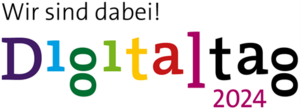
The federal government has launched a “Digital Day“ this year. The TiPP project took this as an opportunity to present insights into the digitalization in pig farming under the leadership of the Lower Saxony Chamber of Agriculture. The focus was on artificial intelligence, blockchain and digital identities. Insights into the DigiSchwein and TiPP projects were provided to demonstrate the application potential of these technologies in pig farming. After the presentations and discussions, the participants also visited the fattening barn at the research station in Wehnen.
06.06.2024: INFRASense informiert Schüler*innen über Potentiale der Radverkehrsforschung
The University of Oldenburg, which is celebrating its 50th anniversary this year, organized an interactive information event with the "Entdecker*innentage Mathematik, Informatik und Naturwissenschaften", which was intended to spark interest in university research with a focus on mathematics, computer science and natural sciences, especially among children and young people. The INFRASense research project, which is developing a data-based evaluation of the cycle path network with the active participation of citizens, was also represented at Campus Wechloy. On Friday, May 31, pupils (from year 7) and their teachers had the opportunity to ask the project questions and find out more about the opportunities for participation. On Saturday, June 1, the event was open to the interested public. Among others, committed cyclists and municipal planning staff visited the project to discuss the quality of the cycling infrastructure in Oldenburg and the surrounding municipalities.
Worldiety GmbH, represented by Maximilian Kolde and Christoph Struth, presented the BIQEmonitor as a practice partner, which displays the quality of the cycling infrastructure based on sensor data. The website also makes it possible to provide feedback on the cycling infrastructure and evaluate it. VLBA developed the Radar cycle path in INFRASense, which supplements this data with accident, traffic and cycle infrastructure data, among other things, to provide additional insights into the quality and potential problems of the cycle path network. We would like to take this opportunity to thank you for the lively interest and the many questions asked, which will inspire further data-based cycling research.
05.06.2024: IT-Speeddating as Part of the "Lange Nacht der Digitalisierung"
Are you a student looking for exciting entry-level opportunities, internships or practical projects in the IT sector? Then our IT speed dating event is the right place for you!
On 14 June 2024 from 3 to 5 p.m., the IT network TECI_OL will bring together IT-interested young professionals like you with leading IT companies in the region as part of the “Lange Nacht der Digitalisierung”. In an entertaining and dynamic speed dating format, you will have the chance to find your perfect match for a professional future together.
28.05.2024: Successful Project Meeting for the "5G Smart Country" Project in Schöppenstedt
On May 28, 2024, the project consortium of the "5G Smart Country" project convened at the innovative DStation in Schöppenstedt, a modern co-working station. This gathering marked a critical step in the development and implementation of 5G technologies in rural areas.
The main objective of the meeting was to discuss both content and organizational aspects of the project. The participants reviewed the progress made so far and planned the upcoming phases of the project. Special focus was given to addressing the technical challenges and solutions for the upcoming final event at the end of September.
Additionally, key organizational topics such as budget management, scheduling, and future project work with partners were discussed. The productive collaboration and exchange within the consortium highlighted the importance of well-coordinated efforts, which are crucial for achieving the project's goals.
This meeting not only demonstrated the progress of the project but also set the stage for its successful realization and conclusion in the coming months. It illustrates the importance of targeted 5G technology deployment for the development of rural areas and how collaborative efforts can create innovative solutions.
16.05.2024: Zukunftslabor Wasser – Konsortialtreffen 2024
Das Konsortialtreffen im Haus der Wissenschaft (Braunschweig) des Zukunftslabor Wassers war eine gute zweitägige Veranstaltung, aus der mit verschiedenen Arbeitsgruppen tolle Ergebnisse resultierten.
Am ersten Tag wurden die Teilnehmer herzlich mit einer Tasse Kaffee begrüßt, das eine angenehmen Atmosphäre für den Beginn schuf. Prof. Dr. Kai Schröter und Prof. Dr. Jorge Marx Gómez eröffneten die Veranstaltung mit einleitenden Worten, gefolgt von Dr. Volkan Gizli, der die Tagesordnung vorstellte. Dr. Agnetha Flore gab anschließend eine informative Einführung in die Arbeit des ZDIN (Zentrum für digitale Innovationen).
Ein Höhepunkt des ersten Tages war der inspirierende Impulsvortrag von Prof. Dr. Andrea Cominola, der viele anregende Fragen und Diskussionen hervorrief. Ein Gruppenfoto diente als schöne Erinnerung an die Veranstaltung, bevor eine kurze Pause den Teilnehmern Gelegenheit gab, sich auszutauschen und neue Energie zu tanken, bevor es in die Arbeitsgruppen (Breakout-Sessions) ging.
Nach der Pause leitete Malin Delfs (Vertretung für Dr. Laura Herzog) eine lebhafte Diskussionsrunde ein, die nahtlos in spezialisierte Breakout-Sessions überging. Diese boten den Teilnehmern die Möglichkeit, in kleineren Gruppen tiefer in spezifische Themen einzutauchen. Der Tag fand seinen krönenden Abschluss mit einem gemütlichen gemeinsamen Abendessen, bei dem weiterführende Gespräche und Networking im Vordergrund standen.
Der zweite Tag begann mit einem Workshop, in dem die Kernthemen aus einer vorherigen Umfrage intensiv diskutiert wurden. Hier spielte Malin Delfs wieder eine zentrale Rolle und Dr. Volkan Gizli koordinierte wieder die Sitzungen. Die anschließenden Breakout-Sessions ermöglichten es den Teilnehmern, ihre Erkenntnisse zu vertiefen und konkrete Lösungsansätze zu entwickeln.
Nach einer kurzen Erholungspause wurden die Diskussionen in den Breakout-Sessions fortgesetzt und mündeten schließlich in einer abschließenden Zusammenfassung. Prof. Dr. Jorge Marx Gómez fasste die Ergebnisse des Workshops zusammen und gab einen Ausblick auf zukünftige Aktivitäten des ZDINs. Mit einer herzlichen Abschiedsrede von Prof. Dr. Kai Schröter endete schließlich die Veranstaltung.
Wir danken allen Teilnehmern für ihr Engagement und freuen uns auf weitere spannende Veranstaltungen.
08.05.2024: Consortium meeting "Transparency in Pig Production" - TiPP
On May 8, 2024, the consortium partners of the TIPP project met for a face-to-face workshop. At the invitation of Böseler Goldschmaus, associated partner of the project, the workshop took place in Garrel. After a presentation of the progress made in the individual work packages, the main topic of documentation obligations was introduced with a keynote speech. Following on from this, the topic was discussed in depth in groups and the possible contributions from TiPP were discussed. Finally, the participants were given a tour of the plant and were given an insight into slaughtering, cutting and processing.
25.04.2024: Girls' Day - Insights into the Logistics of the Future
On 25.04.2024, the VLBA department welcomed 6 schoolgirls from grades 5-8 as part of this year's Girls' Day.
Under the title "Drones & Artificial Intelligence - Insights into the Logistics of the Future", Steffen Meeuw presented the research cooperation between the University of Oldenburg and abat AG. The keynote speech focused in particular on the optimisation of inventory processes through the use of drones.
After the practical impressions, the interested students were allowed to get active themselves: they had to navigate a small drone with programming modules through a set parkour, past obstacles and land it precisely. At the end of the event, the participants were given the opportunity to fly a camera drone over the Campus Haarentor.
The VLBA department would like to thank abat AG for their support in organising the Future Day and wishes the participants every success in their future academic and professional careers.
23.04.2024: Kick-off meeting of the HEIBlue project
The kick-off meeting of the HEIBlue (funded through Erasmus+) project took place at the University of Seychelles in the Seychelles on April 23rd - 25th. This event marked the start of an international collaboration aimed at advancing the Blue Economy theme with partner countries (Spain, Portugal, Mauritius, Comoros, Madagascar and Seychelles).
23.04.2024: Engagierte Studierende gesucht für die Teilnahme an der NEWW Summer School in Kigali, Ruanda
Im Rahmen des Forschungsprojektes NEWW suchen wir motivierte Studierende, die
Interesse an einer einwöchigen Summer School in Kigali, Ruanda haben.
Das Network for Labour-Market oriented Education in Waste and Water Management for the
Sub-Saharan Region (NEWW) ist eine Kooperation zwischen der Universität Oldenburg (UOL)
mit ihrem Zentrum für Umwelt- und Nachhaltigkeitsforschung COAST und dem Zukunftslabor
Wasser des Zentrums für Digitale Innovationen (ZDIN) in Deutschland, der University of
Ghana (UG) in Ghana sowie der University of Arts and Technology Byumba (UTAB) in Ruanda
und deren Wirtschaftspartnern. Gemeinsam befassen wir uns mit den Herausforderungen
und Potenzialen, die den Arbeitsmarkt in den Schlüsselsektoren Wasser und Abfall in Ghana
und Ruanda beeinflussen. Die gewonnenen Erkenntnisse aus den einzelnen Ländern fließen
in praxisorientierte Lehr- und Weiterbildungsaktivitäten zum übergreifenden Thema der
Kreislaufwirtschaft in der Abfall- und Wasserwirtschaft ein.
Geförderte Studierende aller beteiligten Universitäten werden während der Summer School
an verschiedenen Workshops zu Modulentwicklung und wissenschaftlichem Arbeiten
teilnehmen. Zudem haben sie die Möglichkeit, eigene wissenschaftliche Projekte, Arbeiten
und Präsentationen während und nach der Veranstaltung anzufertigen und gegebenenfalls
zur offiziellen Publikation einzureichen.
19.04.2024: Successful Kick-Off of the GENIUS Project Group
The project group "GENIUS - Generative AI in company-specific applications" was launched during this year's summer semester 2024. The project group is an essential part of the Master's degree program in Information Systems and Computer Science, in which students spend a year together gaining practical experience with the challenges, tasks and processes of larger projects.
The "GENIUS" project group is conducted in collaboration with the long-standing cooperation partner abat AG. To get to know each other for the first time, a project kick-off of the group took place on April 5 at abat AG in Bremen. For one year, the project group is dedicated to the integration of generative AI in the corporate environment of abat AG. In addition to developing technical and innovative solutions, a particular focus is on organizing themselves within the project and establishing effective workflows.
The students are looking forward to continuing the collaboration and are excited to see how the project will develop over the coming months.
18.04.2024: Heat transition in the thick of it!
The midterm meeting of the Wärmewende Nordwest project took place on 17 April 2024. The conference took place at CORE in Oldenburg under the motto ‘Wärmewende Mittendrin!’. The focus was on digital support solutions for the heating transition in buildings, neighbourhoods and municipalities. The approximately 75 participants were presented with exciting presentations and discussions by experts from science, business and municipal practice. After the welcome address by Prof. Dr Sebastian Lehnhoff, there was first a presentation by Yannik Beermann from the Competence Centre for Municipal Heat Transition (KWW) on the development of municipal heat planning. This was followed by a networking carousel at the Market of Opportunities, where researchers were able to present their current results and develop new perspectives, ideas and concepts in dialogue with the participants. Prof. Dr. Oliver Opel from Norddeutsche Wärmeforschung, Dr. Peter Lorenzen, Managing Director of Wärmewerk GmbH and Gregor Jaschke from the Competence Centre for Energy Efficiency through Digitalisation (KEDi) contributed further presentations on the opportunities and challenges of digitalisation and the amendments to Section 14 EnWG.
Finally, there was a panel discussion with Eike Bronn (KEAN), Ruth Drügemöller (Oldenburg City Councillor), Jannik Hartfil (EWE Netz), Dr Peter Lorenzen and Birgit Schütte (GSG Energie) on current issues relating to regulation, acceptance, participation, municipal involvement and building management in the heating transition.
The mid-term conference was moderated by Carola Schede, the panel discussion by Matthias Schneider (Treurat und Partner Unternehmensberatungsgesellschaft mbH).
12.04.2024: AI@Smile Project Meeting in Oldenburg
On April 11th and 12th, 2024, a personal project event took place in Oldenburg, where project partners from various European countries came together to advance Project AI@Smile. Representatives from Spain, Italy, Serbia, Turkey, Greece, and Germany participated. During the two-day meeting, a variety of project activities were carried out, including discussions on past and upcoming key activities and the development of a sustainability framework for the project.
The diversity of the participants was reflected not only in the countries represented but also in the different perspectives and expertise they brought to the table. This diversity proved to be extremely enriching for the discussions and decisions made during the meeting.
The personal interaction allowed participants to engage deeply and get to know their colleagues in the project better. This not only contributed to strengthening team spirit but will also have a long-term positive impact on the project's progress.
Overall, we can look back on two intense but extremely productive days that will contribute to advancing Project AI@Smile successfully and ensuring its sustainability.
21.03.2024: Fahrradmobilität in Oldenburg – die Science Bench bei „Hallo Fahrrad“
mit Johannes Schering, Department für Informatik, Universität Oldenburg
Eine Bank, zwei Plätze und jede Menge Raum für wissenschaftliche Gespräche mitten in der Oldenburger Innenstadt – das ist die Idee der Science Bench. Ein Wissenschaftler oder eine Wissenschaftlerin setzt sich auf einem zentralen Platz auf die Bank und lädt Bürgerinnen und Bürgern ein, sich dazuzusetzen.
Am 14. April ist die Science Bench Teil des Fahrradtages „Hallo Fahrrad“ in der Oldenburger Innenstadt. In der Zeit von 15.00 bis 16.30 Uhr wird die Bank zwischen Rathausmarkt und Schlossplatz stehen.
Dann nimmt Johannes Schering auf der Bank Platz. Als Wissenschaftlicher Mitarbeiter am Department für Informatik der Universität Oldenburg in der Abteilung Wirtschaftsinformatik / Very Large Business Applications setzt er sich in seiner Forschung mit dem Thema Fahrradmobilität auseinander.
Alle Interessierten sind herzlich eingeladen vorbeizukommen, neben Herrn Schering Platz zu nehmen und ihn mit Fragen zum Thema Fahrrad und Mobilität zu löchern.
21.03.2024: 6th consortium meeting in the Wärmewende Nordwest project
The 6th consortium meeting in the Wärmewende Nordwest project took place on March 12 and 13, 2024. The two-day meeting took place at OFFIS in Oldenburg. After the initial get-together, Prof. Dr. Sebastian Lehnhoff welcomed the attendees. The event was moderated by the overall project manager, Christine Rosinger. Over the course of the two days, all six research fields and the two cross-sectional activities were able to present their progress. Topics that were in focus included
- Linking teaching with the project
- Prototype presentations
- Central monitoring and control of buildings with open standards
- Thermal load prediction and CO_2 analysis of a university energy system
- Transformation of existing heating networks
- Municipal heat planning and the agreement of this with the project.
- Data platform for the project
- Public relations activities
In addition to the preparation for the interim report, the upcoming mid-term meeting at the project mid-term was also discussed. The presentations identified further starting points for collaboration across research fields, which will be discussed in the coming weeks. The event was rounded off with joint social activities at the end of each conference day.
15.03.2024: Data Challenge 2024
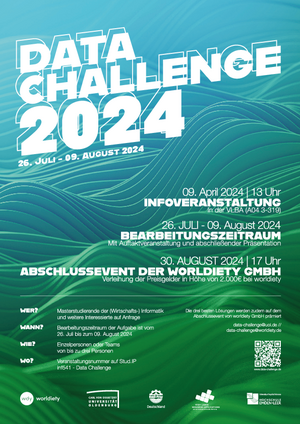
Hello students,
Once again this year, we cordially invite you to the Data Challenge 2024 in cooperation with worldiety GmbH. You will face an exciting challenge and work on it as part of a block course (two weeks) during the lecture-free period.
In addition to the ECTS, you can also win something from our cooperation partner, as they will award a prize for the best three teams 1 - 3 overall (€2000 divided between 1st - 3rd place). So why not take part in this Master's event and get ECTS and the prize money.
You will receive all information about the procedure at the information event.
When? 09.04.2024, 13:00 h
Where? A04 3-319 (meeting room of the VLBA) or online for participants of the Emden University of Applied Sciences
Greetings
The lecturers
27.02.2024: First Career Fair of the NEWW research project in Rwanda a complete success
From the 26th to 28th of February, the Partners of NEWW met in Byumba, Rwanda to conduct the first official Career Fair of the project. Joined by Industry Partners from Oldenburg, as well as researchers from the University of Ghana, the main event took place on the 27th at the University for Technology and Arts of Byumba (UTAB). It was a very productive exchange between Universities, Industry Partners and students. The Goal of the event, which will be organized twice per year (once at UTAB and once at the University of Ghana), was to inform students about internships and Job opportunities during or after their graduation as well as an exchange of know-how between industry partners from different countries.
09.02.2024: Second Strategic Workshop of Center for Sustainability and Environmental Research in Oldenburg Draws Interests of participants from all Faculties
The Center for Sustainability and Environmental Research hosted its highly anticipated second strategic workshop on Friday, February 9th, attracting around 40 enthusiastic participants from all university faculties. The event was a major milestone for the transformation of the center, with attendees engaging in fruitful discussions and collaborative efforts aimed at advancing sustainability initiatives across campus.
30.01.2024: Successful Kick-Off of the KPI4HE Project
On January 30th and 31st, the kick-off for the groundbreaking KPI4HE project took place at the Yerevan State University (YSU) in Yerevan, Armenia. This event marked the beginning of an international collaboration aimed at defining and implementing key performance indicators in higher education. The participants' list included academics and professionals from prestigious universities, such as the University of Oldenburg, the Dresden University of Technology, the University of Genoa in Italy, and the hosting institution, Yerevan State University.
The kick-off was a complete success and provided a platform for the exchange of ideas, the development of common goals, and the planning of the next steps. The participating universities brought a variety of experiences and perspectives, enriching the dialogue and collaboration. It was an opportunity not only to concretize the project objectives but also to lay the foundations for a lasting partnership between the institutions.
The University of Oldenburg has taken on the honorable task of leading Work Package 1, which deals with the exploration and definition of KPIs (Key Performance Indicators). This task is crucial for the project as it lays the groundwork for developing a robust and effective evaluation system for higher education institutions. The team from Oldenburg brings extensive experience and expertise in this area, making them an indispensable part of the project.
The event in Yerevan was not just a working meeting but also an opportunity to experience the rich culture and history of Armenia. The Yerevan State University, as one of the leading educational institutions in the country, provided the perfect setting for this international exchange.
A highlight of the project will undoubtedly be the meeting at the end of September, where the University of Oldenburg will have the opportunity to welcome the project partners. This will be another important milestone in the collaboration, assessing progress and planning the next steps.
The successful kick-off event in Yerevan has set the course for an ambitious project with the potential to significantly improve performance evaluation in higher education. The collaboration between the involved universities is proof that significant progress can be made through joint efforts and the exchange of knowledge and best practices.
We look forward to the coming months and the further developments in the KPI4HE project with great anticipation. The successful kick-off is a promising start, and we are confident that our collaborative work will lead to innovative solutions and improvements in higher education performance evaluation.
29.01.2024: Meeting with Björn Thümler and Jan Müller
A meeting was held today with Björn Thümler, Member of the State Parliament and former Minister for Science and Culture, and the President of the Chamber of Industry and Commerce, Jan Müller. The Zukunftslabor Wasser (ZLW) was presented to them. Further suggestions emerged from the exchange, which are to be explored in greater depth in the future as part of continued cooperation.
Presentation on the Zukunftslabor Wasser
08.01.2024: Disputation Dirk Bendlin
On January 8th, 2024 As part of his disputation, MSc Dirk Bendlin defended his dissertation entitled “Data-driven decision-making processes using the example of the data value chain of offshore operations management and maintenance
Wind farms in large projects” successfully. Congratulations from the VLBA department.

